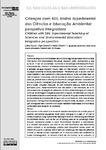Crianças com NEE, ensino experimental das ciências e educação ambiental: perspetiva integradora

Ver/
Use este enlace para citar
http://hdl.handle.net/2183/22410
A non ser que se indique outra cousa, a licenza do ítem descríbese como Atribución-CompartirIgual 3.0 España
Coleccións
Metadatos
Mostrar o rexistro completo do ítemTítulo
Crianças com NEE, ensino experimental das ciências e educação ambiental: perspetiva integradoraTítulo(s) alternativo(s)
Children with SEN, experimental teaching of sciences and environmental education: integrative perspectiveData
2017Cita bibliográfica
Ambientalmente Sustentable, 2017, 23-24: 249-256. ISSN: 1887-2417
Resumo
[Resumo] O presente artigo tem como finalidade dar a conhecer algumas atividades desenvolvidas com alunos com Necessidades Educativas Especiais (NEE), pertencentes a uma turma de 1.º ano de escolaridade, recorrendo à metodologia enformada pelo Ensino Experimental das Ciências e a temáticas ambientais pertinentes, como, por exemplo, a utilização da água enquanto recurso cada vez mais escasso, domínio em que a Educação Ambiental se revela preponderante. Pretende-se que os alunos com NEE sejam cidadãos o mais autónomos e interventivos possível, numa sociedade cada vez mais complexa e consumista, onde as escolhas de todos em geral, e de cada um em particular, poderão fazer a diferença em termos de utilização racional e sustentável de recursos escassos e ameaçados pela má gestão do ser humano. Uma escola inclusiva tem a função, enquanto instituição, de criar condições para que todos os alunos aprendam juntos, independentemente das dificuldades e das diferenças, tal como preconizado pela Declaração de Salamanca. Sendo a temática da água um conteúdo curricular de abordagem obrigatória para todos os alunos, foi elaborado um conjunto de atividades práticas e experimentais com o intuito de os ajudar a tomar consciência da importância da correta gestão da água e do envolvimento de todos para alcançar tal propósito. Na sequência da participação dos alunos nestas atividades, verificou-se que conseguiram fazer conexões com outras realidades relacionadas com a temática, extrapolando para situações do quotidiano. [Abstract] The purpose of this article is to reveal the activities developed with a small group of students with special educational needs (SEN), belonging to a class of 1st year of primary education, using Experimental Teaching of Sciences methodology and relevant environmental themes, such as the use of drinking water as an increasingly scarce resource, educational domain in which Environmental Education is preponderant. It is intended that students with SEN be the most autonomous and interventional citizens possible in an increasingly complex and consumerist society where the choices of everyone in general, and of each one in particular, can make the di erence in terms of rational use and sustainable use of resources scarce and threatened by human mismanagement. An inclusive school has the function, as an institution, to create conditions for all students to learn together, regardless of di culties and di erences, as recommended by the Salamanca Declaration. Since the theme of water is a compulsory curricular content for all students, a set of practical and experimental activities were developed to help them become aware of the importance of proper water management and the involvement of all to achieve this purpose. Following the participation of the students in these activities, it was veri ed that they were able to make connections with other realities related to the subject, extrapolating to everyday situations
Palabras chave
Ensino experimental das ciências
Educação ambiental
Necessidades educativas especiais
Experimental teaching of sciences
Environmental education
Special educational needs
Educação ambiental
Necessidades educativas especiais
Experimental teaching of sciences
Environmental education
Special educational needs
Dereitos
Atribución-CompartirIgual 3.0 España
ISSN
1887-2417






